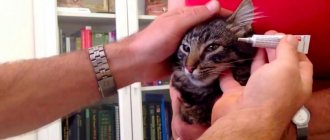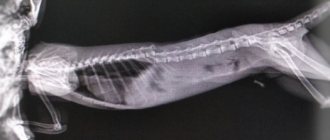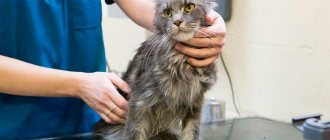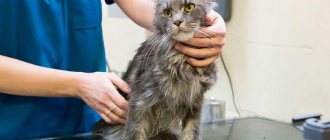The life and health of kittens directly depends on its owner. One of the dangers is worms in a kitten; they can harm not only the health, but also the life of the pet. Parasites can live not only in the intestines, but also in the liver, muscles, blood and even in the baby’s heart. A pet infected with helminths represents a danger not only to its own health, but also to everyone around it; children are especially susceptible to infection. Kittens are most often exposed to such dangers as worms, and their symptoms are much more pronounced than in adults.
Ways of infecting kittens with worms
Even a kitten that has never left the house can get this disease:
- Infestation in kittens less than one month old can occur from an infected cat; as a rule, infection occurs in utero. Babies often become infected while breastfeeding.
- The owner can bring worm eggs into the house on his shoes or clothes, because the larvae of these parasites are found in large numbers in our environment: in the sand, soil, on the grass.
- You can infect your baby if you give him raw tap water.
- If there is contact with a sick animal, then the baby, who has a weak immune system, has a 100% risk of infection.
- Infection from a trash can very often occurs, this is especially true in the summer, since flies land on it, which spread parasite eggs.
Make an appointment
The clinic offers the services of an experienced gastroenterologist, candidate or doctor of medical sciences, who will make a preliminary diagnosis, prescribe only the necessary studies according to the results of the examination, and write out a treatment plan. Having our own laboratory allows us to quickly obtain tests, and the absence of queues and appointments by appointment allows us to prescribe treatment as soon as possible. To make an appointment, select the doctor you like and fill out the form on the website, use the general appointment form, the function to order a call back, or simply call our contact center.
Signs of parasites
External signs that help identify worms in a pet are quite varied, they depend on the location of the parasite. But there are general symptoms that help determine whether the baby has helminths:
- Lack of appetite.
- Losing weight.
- A kitten infected with worms develops and grows poorly; it lags behind its peers in parameters.
- Signs of intestinal distress: diarrhea, constipation, vomiting. If the baby vomits, then you need to check if he has worms.
- Bloating.
- There are signs of parasite infection such as purulent discharge from the eyes.
- Irritation of the anus, it can be understood if the baby fidgets on its tail on some rough surface.
- The most common symptoms are the external appearance of the pet being unkempt. The cat is kind of unkempt, unattractive, his fur is dull, with tufts.
- When the infestation is strong enough, the parasites can come out along with the feces.
Diagnostics
Having discovered the above symptoms, in order to begin proper treatment, you need to contact a veterinarian for diagnosis. He can determine the type of helminths, this is extremely necessary in order to prescribe effective treatment. A stool test collected in a special container will help determine whether there are helminths, and if so, what type is present in the cat’s body.
There are types of helminths that feed on the blood of cats. As a result, a fragile baby may develop anemia. If left untreated, it will be life-threatening for your pet.
Symptoms
There are a lot of symptoms, and individual manifestations depend on which helminth eggs have entered the body. Next, we will talk about the general symptoms for all parasitic infections, and then about enterobiasis, ascariasis and 5 other types of infections.
General symptoms:
- increased irritability, restless sleep, decreased perseverance and attentiveness, frequent hysterics and anger;
- increased appetite associated with active weight loss;
- symptoms from the digestive system - diarrhea, constipation, nausea, pain in the right hypochondrium;
- dizziness and headache;
- food allergies;
- nasal discharge;
- diseases and infections of the reproductive system;
- brittle nails/hair;
Enterobiasis is a helminthiasis in which the body is infected by pinworms. The larvae emerge from the eggs within 4-6 hours; in 2-4 weeks they become adults - grayish or white roundworms 5-10 mm long. They settle in the cecum and appendix, and lay eggs outside the anus - at night, female pinworms come out into the air for this purpose. This reproduction mechanism leads to severe itching at night - hence restless sleep, tossing and turning, and screaming.
Additional special symptoms:
- night urination;
- grinding teeth;
Ascariasis is a helminthiasis in which the body is colonized by roundworms. These worms are already larger - the average length of an adult is 25-30 cm. The larvae and eggs enter the body with insufficiently disinfected fresh fruits and vegetables. The development period takes place in the intestines, after which they pass into the lymphatic and blood vessels, and with the flow of blood and lymph they are distributed throughout the body - in the liver, heart, lungs. They then enter the oral cavity and are re-swallowed. From this moment, adult roundworms begin to develop. This takes approximately 3 months.
How to suspect the presence of worms in children:
- the liver, spleen, lymph nodes enlarge;
- the temperature rises, sometimes up to 38 degrees;
- malaise and weakness appear;
- respiratory pathologies develop - pneumonia, bronchitis and bronchial asthma;
- pressure drops;
- Gastrointestinal symptoms appear - constipation, diarrhea, nausea and vomiting, pain in the form of contractions;
- fear of light;
- nightmares at night;
- dry cough - sputum with an orange tint and bloody spots.
It is more difficult to breed roundworms than pinworms, since the female lays almost 250 thousand eggs every day. In no case should you rely on traditional methods or buy the first remedy you come across at the pharmacy - be sure to contact a specialist.
These are not all worms in children that inhabit the body. There are more than 300 species of helminths in the world, and 70 of them are found in Russia alone. In addition to the two listed types, 5 more types are becoming widespread:
- trichocephalosis - characterized by a lag in both physical and intellectual development, but in general it is almost asymptomatic;
- opisthorchiasis – the temperature rises, the nodes of the lymphatic system enlarge, skin rashes appear;
- hymenolepiasis – the main consequence is rhinitis;
- toxocariasis - has many symptoms that distinguish it from other helminth infections: keratitis, cough with suffocation, ophthalmitis, chorioretinitis, facial swelling;
- wide tapeworm - characterized by anemia, intestinal disorders, pain in the abdominal area.
Infants may experience symptoms after just a few weeks of life if they have received the eggs and larvae of worms from their mother, for example during childbirth. As a rule, symptoms manifest themselves in the form of lack of weight gain, excessive drooling, rash, pallor, blue under the eyes, constipation. The child is constantly worried, screams, sleeps and eats poorly. The screaming can be unbearable and the baby will turn blue in the process.
Worms are often the cause of the development of pulmonary pathologies and are diagnosed using ultrasound or x-ray. Parasites, in particular Echinococcus tapeworm, can damage not only the respiratory system, but also move further to the brain and heart. In areas where helminths develop in the lungs, scars and adhesions appear, and the shape of the lungs begins to change. Such changes provoke a wide range of diseases - asthma, fibrosis, bronchitis, pleurisy, emphysema, etc. When a tapeworm enters the lungs, echinococcosis is formed, when the parasite develops in the form of a cyst.
Symptoms will largely depend on which helminth has entered the body, but the child’s anxiety and the presence of the above general symptoms should alert parents. If signs of worms appear, make an appointment with a pediatrician or gastroenterologist to get tested in a timely manner.
Treatment
What to do if worms are discovered in the laboratory? First of all, you need not to panic, but to treat the baby with the help of medications prescribed by the veterinarian.
You cannot select anthelmintic drugs for kittens on your own, as this is dangerous for the baby’s life.
As a rule, treatment for helminths at home can be done after the first month of the baby’s life. When your pet is in danger from a high degree of infection, you can begin treatment without waiting a month. In exceptional cases, treatment can begin at ten days of age.
Kittens should not be given medications designed for an adult animal, as it may not be able to withstand the increased dosage and die from poisoning.
The veterinarian begins to treat the baby with medications developed for kittens and carefully selects the dosage based on the baby’s weight. Subsequently, deworming is carried out once every three months for preventive purposes and ten days before the scheduled vaccination.
It is better to give children specially designed forms that will prevent an overdose. It is best to use products that help remove parasites in the form of a suspension.
In order to quickly rid your baby of parasites, you need to follow simple rules:
- A kitten that is feeding on its mother's milk and has signs of worms must be weaned off its mother's milk before receiving anthelmintic therapy. This is a prerequisite for successful treatment.
- Before administering deworming therapy to kittens, you need to treat them for fleas; for this you can use drops on the withers or a specialized shampoo.
- It is best to give the medicine in the morning before meals.
The most common medications for kittens
Today, veterinary medicine has developed medications for kittens that are convenient to use at home:
- Prazicide suspension can be used in animals less than one month old. It has a fairly wide spectrum of action; it can be used when infected with both roundworms and tapeworms, and at different stages of their development. This drug can be administered to kittens as soon as symptoms of the disease are detected, starting at 2 weeks of age. This is a low-toxic drug that is not burdened with side effects and can be taken without prior use of laxatives.
- Dirofen is a complex drug that can be used in 2-week-old kittens. It causes paralysis in worms, they are removed from the body alive, thereby not harming the baby’s body with decomposition products.
How to worm kittens correctly: instructions
Most anthelmintics used for adult cats will not be suitable for a six-week-old kitten. Drops for application to the withers and tablets are difficult to dose. Therefore, manufacturers do not recommend using the drug in animals under 8 weeks of age and weighing up to 0.5 kg.
The exception is Stronghold drops. They are applied to the back of the head or withers in a place inaccessible to licking. If there are several kittens in the house, the pet is isolated for about half an hour until the solution is absorbed. However, it is best to apply the drops 3 weeks after the second vaccination. They will protect the kitten not only from helminths, but also from fleas.
Tablets are inconvenient to use. For example, Febtal is approved for use from three weeks. However, one tablet is designed for an animal weighing 1.5 kg, therefore, the tablet must be crushed. In addition, it is recommended to give the drug for 3 days in a row, and any violence against a kitten is stress, which also negatively affects health.
Therefore, the safest method of deworming is the use of an anthelmintic suspension. The standard dosage is 1 ml/kg body weight. if the baby weighs -500 g, take 0.5 ml of anthelmintic suspension with an insulin syringe, squirt it into the mouth, close the jaws and make sure that the animal has swallowed the medicine. The optimal time for deworming is morning feeding.
Be sure to read:
Pyrantel for cats: dosage, instructions for use for different forms, indications and contraindications
The effect of helminths on the kitten’s body
Unfortunately, worms in kittens can cause serious complications. When helminths are in the baby’s body, they poison him with the products of their vital activity, thereby causing poisoning. Symptoms of intoxication may appear due to the disintegration of worms after death.
Worms, parasitizing various organs, mechanically disrupt their integrity. As a result, bleeding surfaces appear in the liver, lungs, and gall bladder, in which pathogenic microorganisms quickly develop.
Worms in kittens can lead to intestinal blockage, and sometimes this causes intestinal rupture. In addition, the baby’s body is not strong enough, due to the negative influence of parasites, his immunity decreases.
Consequences of untreated parasitic infestations
Helminthiasis poses a serious danger; without treatment, it can result in death or significant health problems. An infected child poses a danger to the entire family and environment, as it spreads the disease.
Complications of worms in children:
- inflammatory exacerbation of appendicitis;
- epileptic seizures;
- visual impairment of several types;
- allergic reactions with copious nasal discharge;
- developmental lag behind peers;
- sexually transmitted infections, the most common in girls is vulvovaginitis;
- various types of pulmonary manifestations, including bronchial asthma;
- in difficult cases - damage to the brain and heart.
Prevention
Prevention is important so that in the future questions do not arise about how to rid your pet of helminths. Basic recommendations:
- In order not to subsequently be tormented by the question of when it is necessary to urgently worm the baby, you need to carry out these activities regularly with the cat. It is recommended that the cat undergo anthelmintic therapy 10 days before mating and 3 weeks before the upcoming birth.
- From time to time you can give your pet food steamed with garlic; it helps remove helminths quite well.
- It is necessary to carefully monitor the cleanliness of the tray; it must be constantly washed and treated with disinfectant solutions.
- Outdoor clothing and shoes should be kept as far away from the kitten as possible.
- You should not pet the kitten after coming in from the street; you should wash your hands before doing so.
- Regular flea and worm treatment will help keep your pet healthy for many years.
A caring owner should pay attention to the kitten, because it is at this time that the baby’s health is established. In childhood, worms can cause significant damage to a pet's health.
How to do the processing correctly
Only healthy pets can be dewormed. If the kitten is sick, you should postpone treatment and contact a veterinarian.
Many deworming medications can be given with small amounts of food. However, kittens often refuse this food because it acquires a specific smell. Therefore the procedure looks like this:
- Carefully take the kitten and place it on your lap with its belly up.
- Fix the head, holding the pet by the withers, open the mouth.
- At this point, the anthelmintic drug is injected quickly but carefully.
- The jaws are clamped until the kitten makes a swallowing movement.
It is advisable to pat the kitten on the throat - then it will swallow the medicine faster. Then you can treat him with a small piece of his favorite treat.
Important. After the procedure, you should wash your hands thoroughly with soap.
Within 24 hours after treatment, the pet must defecate. When defecation is difficult, give a little laxative or 1-3 ml of vaseline oil. If the situation does not return to normal, you will need the help of a specialist.
How to choose the right deworming drug
Today, anthelmintic drugs can contain one active component that counteracts a specific type of helminth, or a whole complex of active components that destroy various types of parasites.
Cats and kittens can be infected with one type of helminth or several. Therefore, it is better to choose a drug that has a wide range of effects on all types and stages of development of worms.
Since 2004, the research and production company has been producing the anthelmintic drug Prazitel, which has high quality and a wide spectrum of action. The drug is intended for the prevention and treatment of nematodes and cestodes, as well as mixed nematode-cestodes infestations in cats and kittens.
Prazitel actively acts on all types and stages of development of helminths in kittens. The therapeutic effect of the drug is achieved with a single use in 95-100% of cases. The drug does not cause side effects and is optimal in terms of the content of active ingredients.











